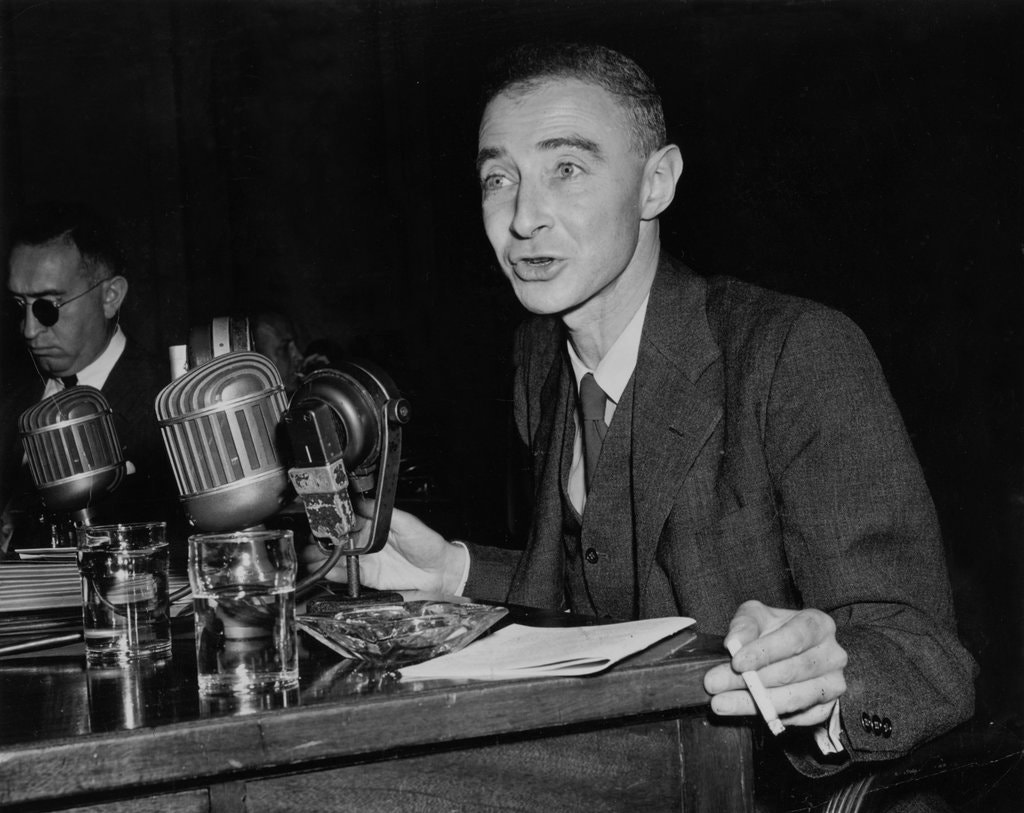Christopher Nolan’s film “Oppenheimer” delves into the life and legacy of J. Robert Oppenheimer, a distinguished physicist whose contributions during World War II significantly impacted the course of history. Julius Robert Oppenheimer, often hailed as the “Father of the Atomic Bomb,” was entrusted by the United States government with the monumental task of developing nuclear weapons. His intelligence and leadership were pivotal in the successful deployment of atomic bombs on Hiroshima and Nagasaki, executed in Los Alamos—a city meticulously constructed to facilitate the Manhattan Project.
Oppenheimer’s role in the bombings marked the zenith of his career, cementing his reputation as a key figure in the advancement of nuclear warfare. However, this period of acclaim was short-lived, as political conflicts within President Truman’s administration and scientific community ultimately overshadowed his achievements.
The Context of World War II
Understanding Oppenheimer’s significance necessitates a comprehensive look at the broader context of World War II (WWII), a global conflict that raged from 1939 to 1945, involving numerous nations across the world. The war was characterized by widespread devastation, immense loss of life, and unprecedented technological advancements in weaponry. Among the most tragic events of this era were the atomic bombings of Hiroshima and Nagasaki, directly linked to Oppenheimer’s work.
The bombings unleashed catastrophic effects, inflicting unimaginable horror and suffering upon the Japanese populace, particularly in the cities of Hiroshima and Nagasaki. Approximately 140,000 individuals perished either instantly or succumbed to radiation-induced illnesses in the aftermath. These events not only decimated entire communities but also left enduring scars on both Japan and the international community.
The use of atomic bombs in warfare was unprecedented, showcasing the devastating potential of nuclear weapons and altering the geopolitical landscape forever. This dark chapter raises critical questions about the legality and ethical implications of using such formidable weaponry under international law.
Bomb Deployment and International Legal Framework
The deployment of atomic bombs during WWII, while strategically significant, sparked intense debates regarding their compliance with international law. The intersection of military necessity and humanitarian considerations forms the crux of this discourse. International law seeks to regulate the use of force to maintain peace, uphold human rights, and preserve the sovereignty of states. When examining the use of bombs, several foundational principles of international law must be meticulously considered:
A. Hague Conventions (1899 and 1907)
The Hague Conventions, established during the first Hague Conference in 1899 and the subsequent conference in 1907, are a series of treaties aimed at codifying the laws of war and minimizing the suffering caused by armed conflicts. These conventions laid the groundwork for modern international humanitarian law.
- Hague Convention II specifically addresses the use of explosive weapons. It prohibits the deployment of projectiles containing explosives or toxic substances designed to cause irreparable harm or excessive suffering. Any violation of these provisions is deemed a breach of international law, undermining the principles of humane conduct in warfare.
- Hague Convention III further delineates the laws and customs of war on land. It introduces stringent regulations concerning the use of weapons and emphasizes the protection of both civilians and military personnel. Key stipulations include:
- Distinction Between Targets: Combatants must differentiate between military objectives and civilian populations. Direct attacks on civilians are strictly forbidden.
- Minimization of Civilian Impact: Military operations should endeavor to reduce collateral damage and avoid unnecessary suffering among non-combatant populations.
B. Geneva Conventions (1949)
The Geneva Conventions, first established in 1864 and significantly expanded in 1949, constitute a cornerstone of international humanitarian law. These conventions are designed to protect individuals who are not participating in hostilities, including wounded soldiers, prisoners of war, and civilians.
- Core Objectives:
- Reduction of Human Suffering: The conventions aim to mitigate the horrors of war by enforcing humane treatment of all individuals affected by conflict.
- Respect for Human Rights: Even amidst war, the fundamental rights and dignities of individuals must be preserved and respected.
- Implementation and Compliance:
- Obligations of States: Participating nations are required to adhere to the provisions of the Geneva Conventions, ensuring that their military operations comply with established humanitarian standards.
- Protection of War Victims: The conventions mandate the protection and care of those injured or captured, prohibiting inhumane treatment and ensuring access to necessary medical care.
The Geneva Conventions remain pivotal in safeguarding human rights during conflicts, providing a legal framework that nations must follow to uphold humanitarian principles even in times of war.
C. Principle of Civilian Protection
A fundamental tenet of international law is the protection of civilians during armed conflicts. This principle underscores the necessity of distinguishing between military targets and civilian entities to prevent unnecessary suffering and loss of innocent lives.
- Differentiation Between Targets:
- Military vs. Civilian Objectives: Attacks should be confined to legitimate military targets, avoiding any direct or indirect harm to civilian populations and infrastructure.
- War Crimes and Violations:
- Serious Breaches: Intentional targeting of civilians or indiscriminate attacks that fail to distinguish between combatants and non-combatants are classified as war crimes.
- Accountability: Perpetrators of such violations are subject to international prosecution, ensuring that breaches of the principle of civilian protection are met with legal consequences.
The Ethical and Legal Debate Surrounding Atomic Bombs
The deployment of atomic bombs on Hiroshima and Nagasaki remains one of the most contentious actions in military history. The ethical and legal implications of using such devastating weapons are profound and multifaceted.
A. Justification of Military Necessity
Proponents argue that the use of atomic bombs was a necessary measure to expedite the end of WWII, potentially saving countless lives that would have been lost in a protracted conflict. The argument hinges on the premise that a swift conclusion to the war mitigated further suffering and destruction.
B. Humanitarian Concerns
Conversely, critics highlight the immense human cost and long-term repercussions of using nuclear weapons. The immediate loss of life, coupled with the enduring effects of radiation exposure, underscores the humanitarian crisis precipitated by the bombings. These actions are scrutinized under international law for potentially violating principles that protect civilians and limit the means of warfare.
C. Legal Interpretations
At the time of the bombings, the legal framework governing the use of atomic weapons was still evolving. While the Hague and Geneva Conventions provided guidelines, the unprecedented nature of nuclear warfare presented novel challenges. Subsequent legal debates have sought to clarify the status of nuclear weapons under international law, with varying interpretations regarding their legality and ethical justification.

The Legacy of Oppenheimer and International Law
J. Robert Oppenheimer’s legacy is inextricably linked to the development and use of atomic bombs. His contributions to the Manhattan Project were instrumental in advancing nuclear technology, but they also sparked enduring debates about the moral responsibilities of scientists and the ethical implications of their work.
A. Scientific Responsibility
Oppenheimer’s role raises critical questions about the ethical obligations of scientists in the development of weapons of mass destruction. The balance between scientific advancement and humanitarian considerations remains a pivotal issue in contemporary discourse.
B. Political Intrigue and Accountability
The political maneuvering that led to Oppenheimer’s fall from grace highlights the complex interplay between science, politics, and ethics. It underscores the necessity for transparent and accountable decision-making processes in matters of national and international security.
C. Impact on International Law
The use of atomic bombs has had a lasting impact on international law, prompting the establishment of stricter regulations and the pursuit of treaties aimed at controlling nuclear proliferation. Efforts such as the Treaty on the Non-Proliferation of Nuclear Weapons (NPT) reflect ongoing endeavors to mitigate the risks associated with nuclear warfare and uphold the principles of international humanitarian law.
Contemporary Perspectives on Nuclear Warfare
In the decades following WWII, the international community has grappled with the implications of nuclear weapons, striving to prevent their use and proliferation. The legacy of the Hiroshima and Nagasaki bombings continues to influence global policies and ethical considerations surrounding nuclear technology.
A. Nuclear Non-Proliferation Efforts
International initiatives aimed at preventing the spread of nuclear weapons are central to maintaining global security. The NPT, established in 1968, is a landmark treaty that seeks to limit the possession and development of nuclear arsenals while promoting peaceful uses of nuclear energy.
B. Disarmament Movements
Advocacy for nuclear disarmament has gained momentum, with various organizations and movements calling for the complete elimination of nuclear weapons. These efforts emphasize the catastrophic humanitarian and environmental consequences of nuclear warfare, advocating for a world free from the threat of atomic destruction.
C. Legal Frameworks and Treaties
Subsequent legal instruments have sought to address the unique challenges posed by nuclear weapons. The Comprehensive Nuclear-Test-Ban Treaty (CTBT) and the Treaty on the Prohibition of Nuclear Weapons (TPNW) represent significant strides toward establishing robust legal frameworks that deter the use and development of nuclear arms.
Ethical Reflections on the Use of Atomic Bombs
The moral ramifications of deploying atomic bombs extend beyond legal considerations, encompassing profound ethical reflections on the nature of warfare and human responsibility.
A. Just War Theory
The principles of Just War Theory, which include just cause, proportionality, and discrimination, provide a framework for evaluating the morality of using force in conflict. The bombings of Hiroshima and Nagasaki are scrutinized through this lens to assess their alignment with these ethical standards.
B. Long-Term Consequences
The enduring impact of nuclear weapons on survivors and subsequent generations raises ethical questions about the intergenerational responsibility and the duty to prevent future atrocities. The long-term health effects and environmental damage serve as stark reminders of the profound consequences of nuclear warfare.
C. Lessons for the Future
Reflecting on the historical use of atomic bombs informs contemporary efforts to prevent similar tragedies. It underscores the imperative for ethical leadership, informed decision-making, and the continuous pursuit of peaceful conflict resolution to avert the recurrence of such devastating events.
Conclusion
The story of Oppenheimer and the use of atomic bombs during World War II encapsulates a pivotal moment in human history, marked by scientific triumph and profound ethical dilemmas. The bombings of Hiroshima and Nagasaki not only altered the course of the war but also reshaped the landscape of international law and humanitarian principles.
As the global community continues to navigate the complexities of nuclear technology and warfare, the lessons drawn from this era remain ever relevant. Upholding the principles of international law, safeguarding civilian populations, and fostering ethical responsibility among scientists and policymakers are essential endeavors in ensuring a future where the horrors of atomic warfare are never repeated.
The legacy of Oppenheimer serves as a poignant reminder of the delicate balance between scientific advancement and moral accountability, urging ongoing vigilance in the pursuit of peace and the protection of human dignity in the face of technological power.












